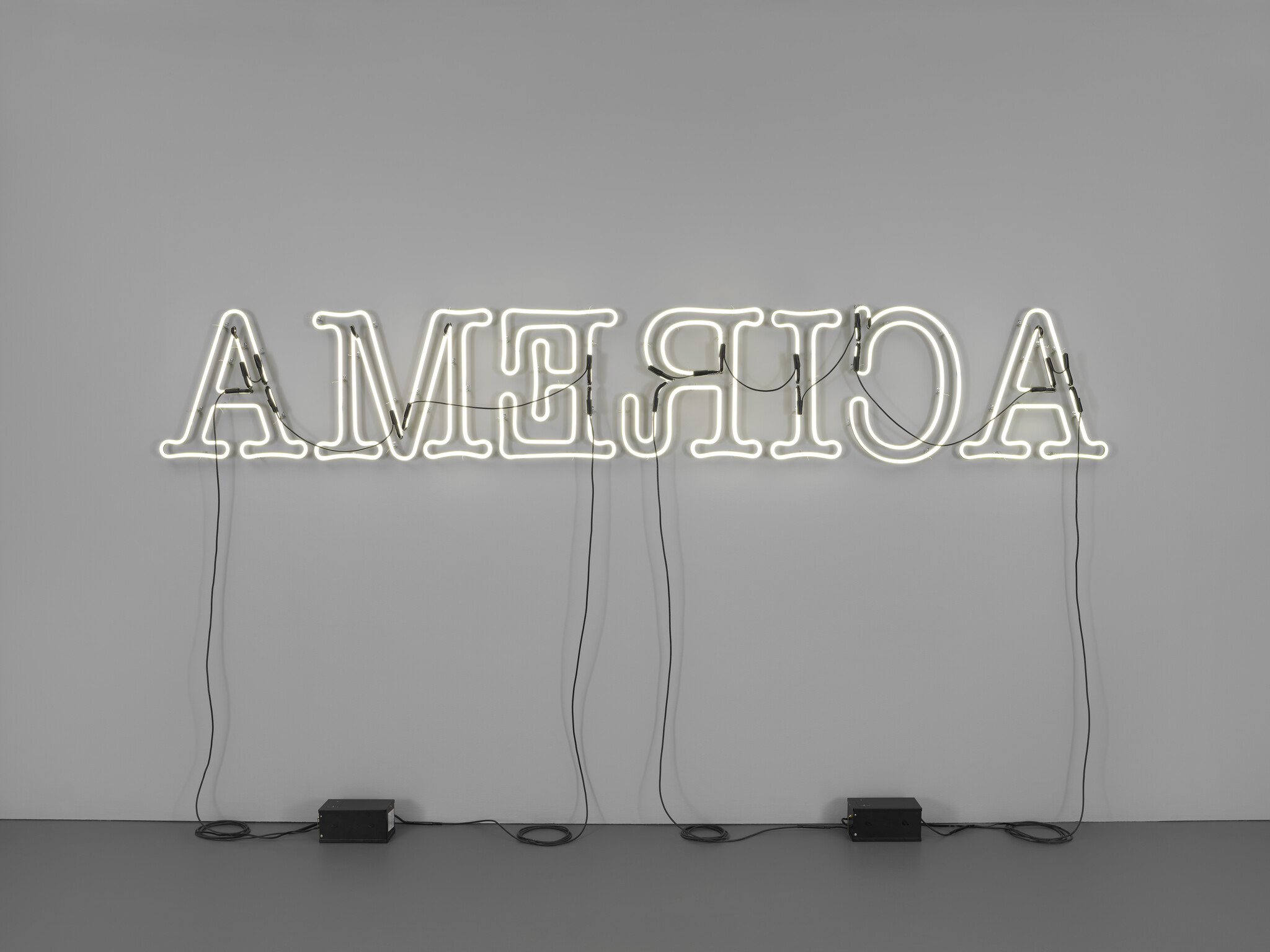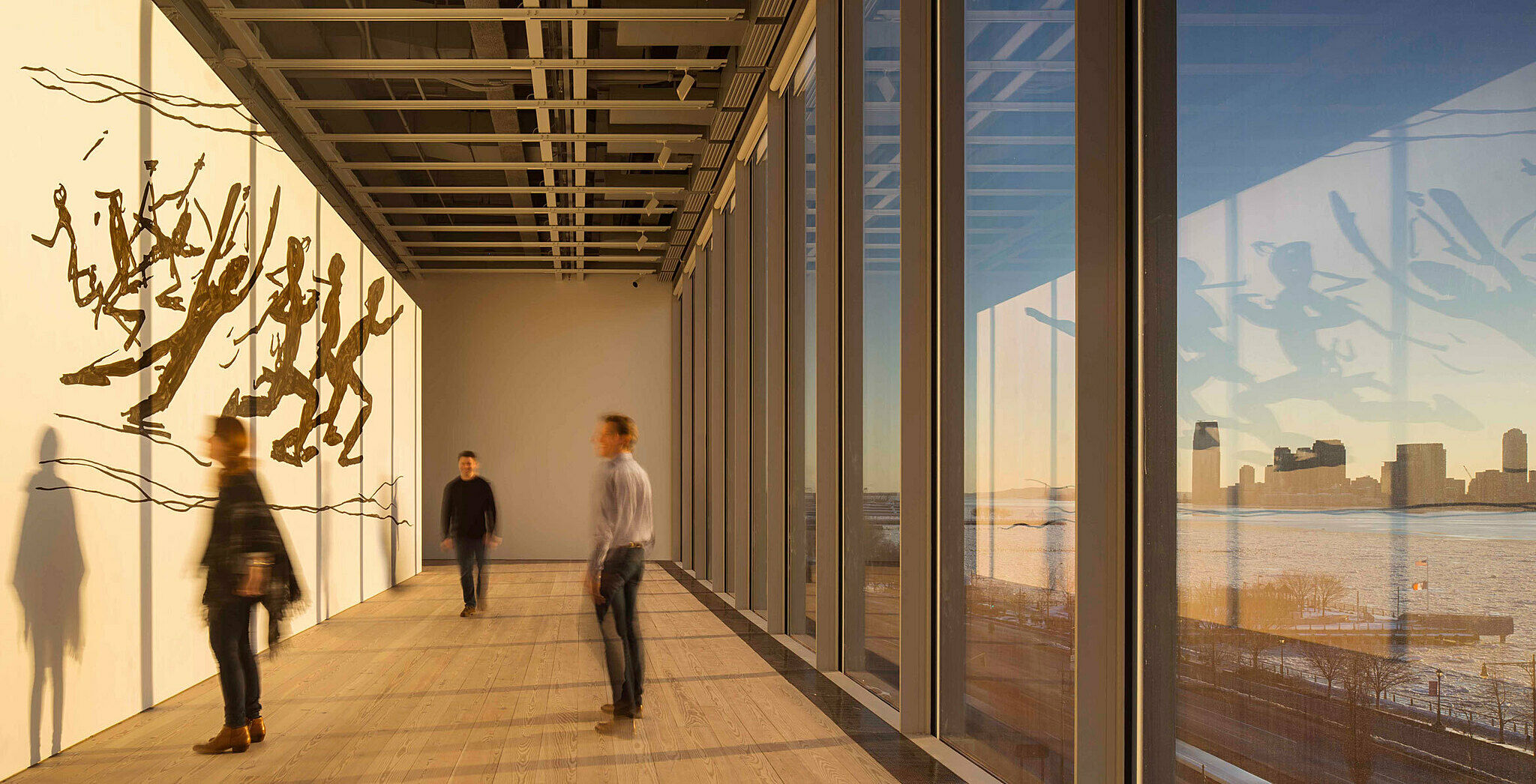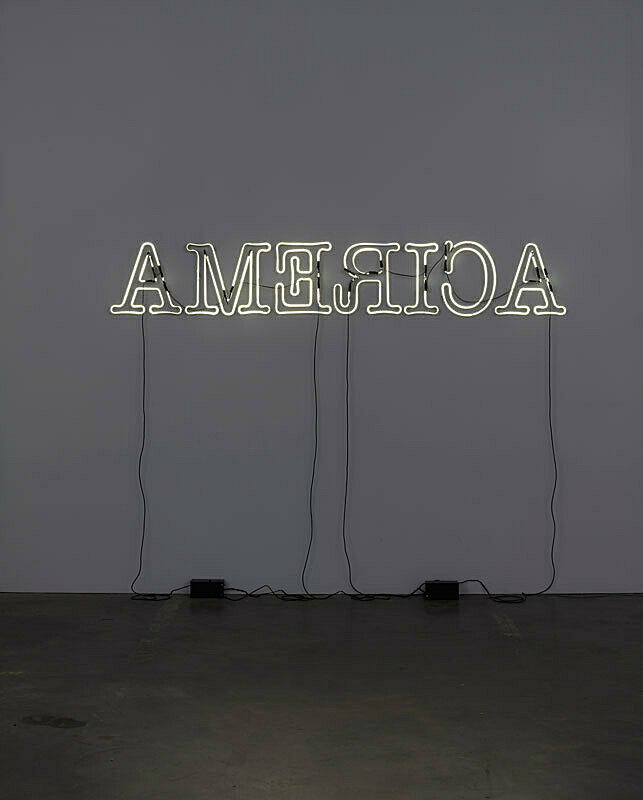Not on view
Date
2009
Classification
Sculpture
Medium
Neon and paint
Dimensions
Overall: 24 × 145 1/2 × 5 in. (61 × 369.6 × 12.7 cm)
Accession number
2011.3a-i
Edition
AP 1/2, Ed. 3
Credit line
Purchase, with funds from the Painting and Sculpture Committee
Rights and reproductions
© Glenn Ligon
Videos
-
Rückenfigur by Glenn Ligon | Installation Timelapse | Behind the Scenes
Audio
-
0:00
Glenn Ligon, RÜCKENFIGUR, 2009
0:00
Narrador: La escultura de neón pintada en la que se lee la palabra “América” y que vemos en esta sala se inspiró en la oración con que inicia la Historia de dos ciudades de Charles Dickens: “Era el mejor de los tiempos, era el peor de los tiempos”. Glenn Ligon nos habló sobre ella con ocasión de su retrospectiva en el Whitney en 2011.
Glenn Ligon: Hice las primeras obras con luces de neón cuando nuestra economía estaba en auge, pero nos encontrábamos en guerra con Afganistán. Bueno, seguimos estando en guerra con Afganistán, pero desde entonces ha sido electo Barack Obama, primer presidente negro de los Estados Unidos.
Narrador: Ligon comenzó a pensar a los Estados Unidos en términos de dicotomías, contrastes, y luz y oscuridad. Los tubos de neón, a veces pintados de negro para conservar la luz dentro, se convirtieron en su nuevo medio. En esta obra, Rückenfigur, lleva unos instantes darse cuenta de que Ligon no ha deletreado AMÉRICA al revés, sino que ha girado cada letra para que apunta hacia la pared. Dado que la “A”, la “M” y la “I” son simétricas, parece que siguieran mirando hacia nosotros. Scott Rothkopf es el Curador Jefe Familia Nancy y Steve Crown, y Subdirector de Programas del Whitney.
Scott Rothkopf: Y esa es una de las cosas más interesantes de esta pieza, creo yo. Esta idea de América, de este país, esta palabra dándonos la espalda al mismo tiempo que se dirige a nosotros. Esta pieza expresa cierta vulnerabilidad: de alguna manera, uno ve la parte de atrás de este letrero, los cables que cuelgan de él. Uno ve las conexiones frágiles entre esas letras, que creo que sugieren la idea de que este país, Estados Unidos, es una confederación que se encuentra a veces tanto unida como dividida. Y creo que todos estos conceptos, en cierta forma, funcionan metafóricamente para expresar el lugar donde este país se ubica en este momento.
Glenn Ligon, RÜCKENFIGUR, 2009
In Glenn Ligon (Spanish)
-
0:00
Glenn Ligon, Rückenfigur, 2009
0:00
Narrator: La escultura de neón pintada en la que se lee la palabra “América” y que vemos en esta sala se inspiró en la oración con que inicia la Historia de dos ciudades de Charles Dickens: “Era el mejor de los tiempos, era el peor de los tiempos”. Glenn Ligon nos habló sobre ella con ocasión de su retrospectiva en el Whitney en 2011.
Glenn Ligon: Hice las primeras obras con luces de neón cuando nuestra economía estaba en auge, pero nos encontrábamos en guerra con Afganistán. Bueno, seguimos estando en guerra con Afganistán, pero desde entonces ha sido electo Barack Obama, primer presidente negro de los Estados Unidos.
Narrator: Ligon comenzó a pensar a los Estados Unidos en términos de dicotomías, contrastes, y luz y oscuridad. Los tubos de neón, a veces pintados de negro para conservar la luz dentro, se convirtieron en su nuevo medio. En esta obra, Rückenfigur, lleva unos instantes darse cuenta de que Ligon no ha deletreado AMÉRICA al revés, sino que ha girado cada letra para que apunta hacia la pared. Dado que la “A”, la “M” y la “I” son simétricas, parece que siguieran mirando hacia nosotros. Scott Rothkopf es el Curador Jefe Familia Nancy y Steve Crown, y Subdirector de Programas del Whitney.
Scott Rothkopf: Y esa es una de las cosas más interesantes de esta pieza, creo yo. Esta idea de América, de este país, esta palabra dándonos la espalda al mismo tiempo que se dirige a nosotros. Esta pieza expresa cierta vulnerabilidad: de alguna manera, uno ve la parte de atrás de este letrero, los cables que cuelgan de él. Uno ve las conexiones frágiles entre esas letras, que creo que sugieren la idea de que este país, Estados Unidos, es una confederación que se encuentra a veces tanto unida como dividida. Y creo que todos estos conceptos, en cierta forma, funcionan metafóricamente para expresar el lugar donde este país se ubica en este momento.
Adam Weinberg: El título de la obra, Rückenfigur, es un término de historia del arte en alemán.
Narrator: Adam Weinberg es el Director Alice Pratt Brown del Whitney Museum.
Adam Weinberg: Describe a una figura de una pintura a quien se ve por la espalda, generalmente contemplando un paisaje grandioso. De muchas formas, Glenn Ligon nos sitúa en esa posición: a través de esta obra nos confronta con el paisaje vasto y contradictorio que es Estados Unidos hoy en día.
Glenn Ligon, Rückenfigur, 2009
-
0:00
May 9, 2015
Gregg Bordowitz on Rückenfigur by Glenn Ligon0:00
May 9, 2015
Gregg Bordowitz on Rückenfigur by Glenn LigonIn 99 Objects
-
0:00
Glenn Ligon, Rückenfigur, 2009
0:00
Narrator: The painted neon sculptures depicting the word “America” in this gallery were inspired by the opening of Charles Dickens’s A Tale of Two Cities: “It was the best of times. It was the worst of times.” Glenn Ligon spoke to us about it on the occasion of his retrospective at the Whitney in 2011.
Glenn Ligon: The first neons that I did were at the moment when our economy was booming, but we were in a war in Afghanistan. Well, we're still in a war with Afghanistan, but since then Barack Obama, the first black President of the United States, was elected.
Narrator: Ligon began to think of America in terms of dichotomies, contrasts, and light and dark. Neon, sometimes painted black to seal in the light, became his new medium. In this work, Rückenfigur, it takes a moment to realize that Ligon hasn’t spelled AMERICA backward. Each individual letter is flipped to face the wall. But because the “A”, the “M,” and the “I” are symmetrical, they still seem to face out towards us.
Scott Rothkopf is the Nancy and Steve Crown Family Curator and Associate Director of Programs at the Whitney.
Scott Rothkpof: And that's one of the really interesting things about this piece, I think, this idea of America, this country, this word facing away from us but at the same time addressing us. There's a sense of vulnerability in this piece—you see the back of this sign in a way, these wires that dangle down. You see the fragile connections between these letters, which I think suggests the sense of America, this country, as a confederacy that's both united and sometimes divided. And I think that all of those things, in a way, function metaphorically for where this country is at this moment.
Adam Weinberg: This work’s title, Rückenfigur, is a German term that describes a figure in a painting who is seen from the back contemplating a grand landscape. In many ways, Glenn Ligon puts us in that position—through his work we are confronted with the vast and contradictory landscape that is America today.
Glenn Ligon, Rückenfigur, 2009



